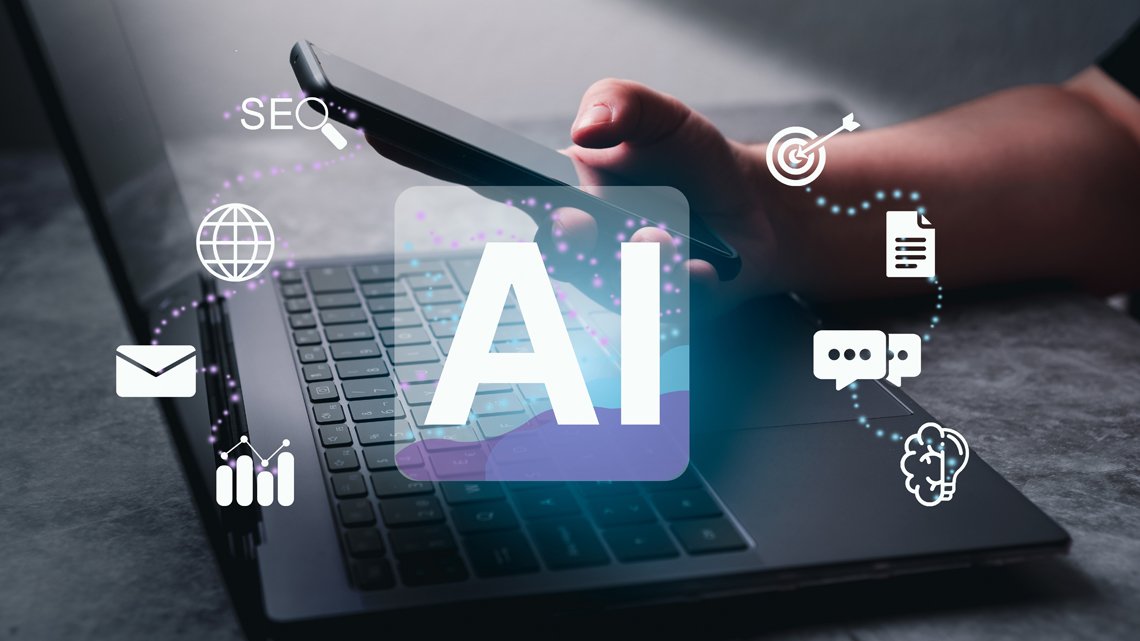
The use of AI in marketing strategies has changed the way businesses promote. Even marketers know that staying relevant among their peers is important for a business to be successful. That’s why marketers are constantly pursuing newer, better technology to achieve their objectives.
Recently, marketers have been using AI to level up marketing practices. Further, we discuss AI in marketing, how it changes strategies, and its future updates.
What is AI in Marketing?
The use of AI techniques and tools like data models, algorithms, and machine learning to gain customers’ insights and build strategic marketing. This can be used in marketing to enhance spending, modify content, and personalize the customer experience.
Benefits of Artificial Intelligence in Marketing
- AI helps to know customers’ search patterns which makes it easy to formulate marketing strategies.
- Through big data and AI one can gain valuable insights and produce ads only to specific customer segments. Hence adopting smart targeted advertising.
- AI-enabled tools help to launch campaigns and analyze results faster and efficiently.
- AI integrated into AR marketing enhances customer experience and brand awareness through virtual information display.
The Role of Artificial Intelligence in Marketing Strategies
- Social Media Listening
Using AI technology in social marketing improves efficiency through social media listening. AI algorithms use aspect-clustering to find invaluable details from data classified for social listening, even if it spans millions of data points. Also helps to manage vast amounts of data to understand their customer’s thoughts and feelings from social media sentiment analysis.
- Personalization at Scale
AI’s influence in modern marketing is most evident through the personalization of content. Traditional approaches for all audiences have been replaced by AI algorithms that process vast pools of data which reveal user behavior, preferences, and demographic data.
- Chatbots and Customer Service
Chatbots have fundamentally shifted customer service. AI-powered virtual assistants can resolve customer interactions, 24/7.
Chatbots can respond, while efficiently handling simple inquiries, freeing up human resources to perform complex interactions, and improving the customer experience.
- Content Generation
With the growth of AI, the processes for content creation and curation are advancing. NLP algorithms can automate the art of writing blog posts, social media captions, and product descriptions for readability and engagement.
Use AI-fuelled content curation capabilities to sort and sift through large amounts of content, to target relevant information to specific audiences.
- Data Analysis to Gain Customer Insights
AI and machine learning provide valuable insights on a wide range of customer attributes that will help you make data-driven decisions. Delve deep into the sentiments of audiences about your brand. Similarly, conduct a full audit of your customer care team’s performance and social media metrics.
- Sentiment Analysis for Brand Reputation
Sentiment analysis is important in marketing strategies to manage a positive brand reputation. When used to extract insights from social media and online mentions, AI tools allow one to track and assess public opinion about their brand versus competitors. Also, address PR issues and negative comments to protect brand reputation.
- Competitive Intelligence
AI tools help identify insights about opportunities to take share by improving your products and services, thereby playing into market inefficiencies. Understand competitor’s share and measure performance at the same time via competitive benchmarking.
The Future of AI in Marketing
AI-driven Audience Building
AI can alter the entire process of building and segmenting target audiences. Gone are the days of poring over demographic data by hand or building buyer personas from scratch. AI will determine in real-time how to dynamically adjust and deliver ads based on input data, establishing target audiences ahead of time.
Computer Vision
Computer vision technology is helping solve significant everyday business issues. It allows ads and campaigns to derive insights based on non-text digital data in the form of raw images. From empowering OCR (Optical Character Recognition) to interpret the information and signatures, recognition brand logos in videos, and extracting text from images for accessibility.
Programmatic Advertising
Imagine an AI system that can regularly monitor the metrics for advertising and instantly adjust them. If an ad is lagging behind expected values, perhaps the AI could optimize the message, change the target audience, or even shift ad spending to other platforms. Here, human intervention would no longer be necessary.
Crisis Management
AI is a transformational technology to protect brand equity when trained correctly. Conducting social listening with an AI system is a way that businesses will recognize a crisis brewing.
If a negative trend begins to snowball, the AI coding could alert and start to suggest and deploy, in real time depending on the nature of the crisis.
Conclusion
In closing, the agility of artificial intelligence and its ability to make timely decisions will enable businesses seeking survival to transition to growth models. In a dynamic environment, this investment is not an optional technology substitution to improving business performance, it should be pursued to build a foundation of growth and future success. Thus, positioning businesses to explore new opportunities for marketing, product, and customer engagement that arise every day.
Visit APAC Entrepreneur for more marketing strategies and updates.
